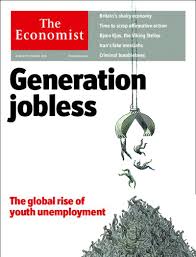The April 27th Economist ran a cover story about the ‘generation jobless’ – the global rise of youth unemployment. It is a serious concern for a number of reasons and one that could have long-lasting implications for both the global economy and political stability.
 Gen Y was the hardest hit by the recession that began in 2008 and kicked up a gear in the following years. The ‘last in – first out’ hiring / firing principle meant that the ‘new kids on the block’ had to go when things became tough and belts were either tightened or taken away altogether. This was a generation that had only just arrived bright eyed and bushy tailed in the work environment only to be told there was no place for them. It was a generation determined to make their mark, to make a real difference and they were more than up for the challenge of restoring some sort of global and environmental equilibrium. In this regard they were unlike their predecessors – Gen X and although these are sweeping generational generalisations, the difference between Gen X and Gen Y in this regard is marked. Armed with such enthusiasm – and some would say naivety, meeting in a head-on collision with the recession and its subsequent job cuts, and general economic meltdown has put this generation into an economic tailspin. It will have a devastating impact on their overall perspective and long-term view. The depression that accompanies being without work will impact on this generation more than most. Exactly how this will play out – a greater distrust for the ‘institution’ and for national politics to name but two things, is hard to predict. But put yourself in their shoes and ask how can it not have enormous consequences?
Gen Y was the hardest hit by the recession that began in 2008 and kicked up a gear in the following years. The ‘last in – first out’ hiring / firing principle meant that the ‘new kids on the block’ had to go when things became tough and belts were either tightened or taken away altogether. This was a generation that had only just arrived bright eyed and bushy tailed in the work environment only to be told there was no place for them. It was a generation determined to make their mark, to make a real difference and they were more than up for the challenge of restoring some sort of global and environmental equilibrium. In this regard they were unlike their predecessors – Gen X and although these are sweeping generational generalisations, the difference between Gen X and Gen Y in this regard is marked. Armed with such enthusiasm – and some would say naivety, meeting in a head-on collision with the recession and its subsequent job cuts, and general economic meltdown has put this generation into an economic tailspin. It will have a devastating impact on their overall perspective and long-term view. The depression that accompanies being without work will impact on this generation more than most. Exactly how this will play out – a greater distrust for the ‘institution’ and for national politics to name but two things, is hard to predict. But put yourself in their shoes and ask how can it not have enormous consequences?
The other concern is that an unhappy, disempowered populace – especially one with youth and energy on their side, fuels social revolutions. Add into that volatile mix the connectivity this generation enjoy through social media and you have all the raw ingredients of social upheaval. The Arab Spring and London riots being recent examples of what can happen when these forces converge into a ‘perfect storm’.
South Africa’s biggest risk is a future of large numbers of unemployed youth. This is a slight twist on what has taken place in Europe but the inherent risks remain the same with the similarity in both context and conditions. We will save our future in South Africa through sound education today – and this assumes an education specifically shaped to ensure that the youth emerging from the educational system are employable. Currently we are failing in meeting this challenge.
These broad concerns speak to demographic issues that are like rising damp in a wall: easy to ignore and gloss over, until it is too late. And like any demographic issues that take time to reach their boiling point, so it takes time for any viable solution to be felt.
‘Generation Jobless’…it is a headline that is chilling in it’s implications and one that serves as a stark warning to us all. Exactly what to do about it is less simple, but ignoring it, certainly isn’t an option.


